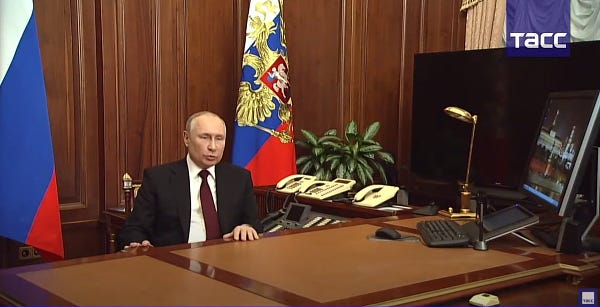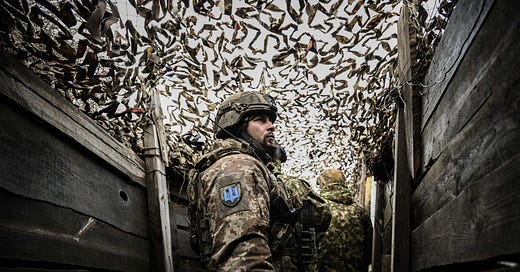
For years, the world has been looking into his eyes to see his soul. There has been a “re-set,” wish-casting, appeasement, self-delusion, and truckling, But now the mask is off.
The international gangster is behaving like an international gangster.
Lithuania’s Prime Minister Ingrida Simonyte tweeted: “Putin just put Kafka & Orwell to shame: no limits to dictator's imagination, no lows too low, no lies too blatant, no red lines too red to cross.”

Vladimir Putin’s invasion of Ukraine is on, and no euphemisms can hide the fact that Putin has launched a war of aggression. In real time, we are also seeing the full, raw power of kinetic disinformation in the hands of an unhinged autocrat.
We knew who he was. Putin told us he was a gangster long ago, but five U.S. Administrations — of both parties — and much of the West have clung to a series of delusions.
Now the delusions are all shattered: Not just the ones about Putin, but also generations of illusions about the security architecture and the threat of sanctions that we imagined would contain and deter him from madness and aggression.
Much of NATO’s brave talk has turned out to be hollow — at least to the Ukrainians now under the gun. As Josh Rogin writes:
What good is unity that doesn’t include the people who are facing the attack? What good is unity that doesn’t involve trying everything possible to stop that attack? What good is unity that is so vague that the united parties can’t even reveal the details of the things they are supposedly united on?
The United States and its European partners have achieved unity among themselves, but their united strategy is so limited that it is failing to solve the problem — and Ukraine might soon pay the price.
And then there is the U.N.


**
Putin’s fiery speech setting the stage for war was a bracing moment. Our friend Tom Nichols watched in real time:




Here’s Carl Bildt, the former Prime Minister of Sweden:


And, lest we missed the larger message here, Putin isn’t Hitler or Stalin. He thinks he is this guy:
**
The big question now is: How will the West respond? Here’s the former US ambassador to Russia:


The good news is that Germany has blocked approval of the Nord Stream 2 pipeline. The bad news?
The White House has stopped short of announcing full sanctions and top E.U. officials acknowledge that Russia has invaded Ukraine, but, but, but:
The officials stopped short of calling it an invasion. “Russian troops have entered into Donbas. We consider the Donbas part of Ukraine,” the E.U. official, Josep Borrell, said in Paris, referring to the eastern Ukraine region that includes the areas claimed by the Russia-backed separatists.
“I wouldn’t say it is a fully fledged invasion,” Mr. Borrell said, “but Russian troops are on Ukrainian soil.”
FFS. And it’s not just the Europeans. Via Politico’s Playbook:
As of Monday night, the White House was refusing to call this an “invasion” — though we’ll see how long that lasts given public pressure from lawmakers. Senior administration officials were awkwardly dancing around the matter in a background briefing with reporters, refusing to answer the “i-word” question because of the consequences it would bring.
Garry Kasparov is not at all impressed:


**
So what happens if it gets worse? Just yesterday, the U.S. said that it has credible information showing that Moscow is compiling lists of Ukrainians “to be killed or sent to camps following a military occupation.”
How will we respond? What sanctions would be proportionate to such war crimes?
**
Some must reads this morning:
Ian Kelly and David J. Kramer, “Ukraine Isn’t the Only Target of Putin’s Aggression”:
While Russian President Vladimir Putin is focused on Ukraine now, his goals are broader. He is intent on keeping Russia’s neighbors looking to Moscow, and not to the West. He also wants to ensure those neighbors do not become successful democracies—i.e., possible inspirations to Russians to question his corrupt and authoritarian rule.
Tom Nichols, “Putin Chooses a Forever War”:
Putin has now affirmed that he refuses to accept the outcome of the Cold War and that he will fight to dismantle the European system of peace and security constructed by the international community after its end. This is Vladimir Putin’s forever war, and Russia, cursed as it has been so many times in its history with a terrible leader, will be fighting it for as long as Putin remains the master of the Kremlin.
Bill Kristol, “The End of America First”?:
So the Biden administration will in this crisis have to lead a nation divided. And not merely a nation divided, but a nation one of whose two major parties, led by our most recent former president who is also that party’s probable next presidential candidate, will likely go out of its way to oppose what must be done to meet the challenges we face.
It would be nice at this moment of crisis to have a constructive and loyal opposition party. Alas, “this is a thing more ardently to be wished than seriously to be expected.”
This makes it all the more important that those Republicans and conservatives who are willing to be constructive and loyal speak up for American world leadership. That they speak up against the demagogues in their midst whom they have failed for too long to repudiate. That they show what it means to shun the partisan and pernicious rhetoric of “America First” and instead act genuinely to put America first.
Quick Hits
1. Civil Lawsuits Can Proceed Against Trump for His Big Lie and Jan. 6th Actions
Kim Wehle, in today’s Bulwark:
This is a big deal not just for Trump, but for the scope of the presidency moving forward. The question is whether presidents can use the power of the office to stay in power, regardless of voters. The answer thus far: No.
2. The Long Crusade of Clarence and Ginni Thomas
You really need to read this new investigation by the NYT:
The Supreme Court justice and his wife battled for years for a more conservative America. New reporting shows how far she was willing to go after Donald Trump’s 2020 election loss.
3. If Democrats Lose Congress, It Won’t Be Because H.R. 1 Didn’t Pass
Jim Swift, in today’s Bulwark:
We’ve written a fair bit about H.R. 1 here at The Bulwark, including a supportive analysis, as well as critiques from Charlie Sykes and Mona Charen. I want to focus on just one provision of the bill, relating to campaign finance. The bill sets forth a plan for “Small Dollar Financing of Congressional Election Campaigns.” Here is how that provision is described by the nonpartisan analysts at the Congressional Budget Office:
Cheap Shots


A reminder that turds are not self-polishing.


The hypocrisy: it burns.








There are two problems, neither of which you address. So let me point them out.
1. You vastly misunderstand what 'America First' means. To the modern American right, America as it current exists is the enemy. This is because the right is not simply against Democrats, but against pop culture itself in all its forms. It's why despite the fact that not one police organization was defunded, they still scream about it. Why despite there being no vast transgender conspiracy, they are openly trying to turn the clock back to the past. In this vein, there's a logical reason why America First is so anti-American.
The project of the American right is to bond itself closer to Putin or Orban-like figures; to destroy America as it is in order to make the America they want. In this viewing, nothing would help their chances of instituting the policies they want than causing chaos at home and abroad. We think of them as reactionaries, but we might better think of them as would be revolutionaries, looking for the right moment to seize control of everything and going to war not just with their political rivals but with the culture they despise and detest. Thus, America First, as they see it, is best suited by the destruction of America.
2. We meet this moment of Putin's invasion with a stark reality: Americans do not actually want to fight for the Ukrainians. I detest the structuring of 'elites' vs 'normal people' because it is lazy and so rarely are the elites defined, but in this case we can define them. The 'elites' of the foreign policy establishment have vastly overestimated their political capital and vastly overestimated the trust people have in them. For twenty years they were given free reign in the middle east, and for twenty years they achieved nothing. For twenty years, Americans were told to trust them, and they repaid that trust with failure.
We can debate what that failure really means. But in the end, what was promised by them, an impossible lift of a democratic and western style middle east, was not brought to fruition. But beyond that, they destroyed the trust that the public had in them. And nothing has been done to fix this.
They have not argued publicly about WHY the public should support actions in Ukraine. They have not explained, in PLAIN ENGLISH, why Americans should care. They have talked a lot about freedom and democracy and systems and morals and ideals, and none of it matters one bit because they are not speaking the language people care about. They are not talking in the lingua franca of the people.
The security establishment likes to talk like it's 1960; they like to talk in euphemisms and with grand gestures of freedom and liberty. But Americans don't speak that language. They need to be open and direct: Putin's invasion is an attack on Americans. Why? Because it will drive up prices of gas, it will destabilize the global social order that allows Americans to have cheap goods and services. You hate inflation now? You'll really hate it when Putin makes it worse. The national security establishment is very, VERY reluctant to talk like this, because it makes them feel like they're the same as their enemies. And in many ways, they are. But if you want Americans to support your cause, you need to talk to them in the language they understand.
Most Americans cannot find Ukraine on a map. You want them to fight for it, you need to explain that the system we built needs to be reinforced if they want to keep reaping the benefits of that system. You want cheap goods? You want cheap gas? Then you gotta be willing to fight against the people who would threaten that.
Relative to sanctions against Russia - when to pull the trigger and how far to go - I do hold some empathy for the US/Nato side. To unload everything now leaves nothing in the quiver for when the Russian tanks start rolling into western Ukraine.
TBH, a full-scale occupation of Ukraine would be a catastrophic outcome... but Putin might want to be careful what he wishes for. It could be the beginning of the end of his regime.